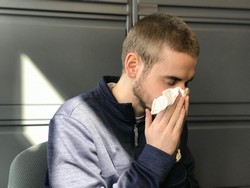Eighteen People Infected With Measles Across New Jersey
 Eighteen people are infected with measles in Passaic County since the outbreak began in Ocean County, according to a recent report published by the Asbury Park Press on Saturday, Dec. 1.
Eighteen people are infected with measles in Passaic County since the outbreak began in Ocean County, according to a recent report published by the Asbury Park Press on Saturday, Dec. 1.
Kathy Maloney, Director of Health Services, explained that the symptoms of measles start with a fever (as high as 104 degrees Fahrenheit), runny nose, cough, sore throat, and red eyes and then progress with a rash that spreads across the entire body. “Measles is caused by a virus and is known medically as rubeola.,” Maloney said. People are considered contagious from four days before to four days after the rash appears. Measles cases typically last for 14 days.
Jeffrey Weisburg, a specialist professor of biology, said, “Measles are no joking matter and can be extremely dangerous. Usually a person infected with measles develops a rash that spread over the entire body that starts out flat but can eventually lead to a raised rash.”
Weisburg noted that the fever that accompanies the rash can be as high as 104 degrees. Measles can cause serious health complications including pneumonia and encephalitis (brain swelling).
Students should be wary of interacting with other students that are infected with the measles virus, as it is highly contagious. Maloney said, “[Measles] is spread through direct contact with air droplets from an infected person. The virus can remain in the air for up to two hours after an infected person leaves the area.”
Emily Kania, a sophomore health studies student, said, “The measles outbreak is absolutely terrifying. There will be, without a doubt, more measles cases in the upcoming month. The worst part about it is that it is 100 percent preventable. I hope people educate themselves and take measures to keep themselves and family members safe.”
“At the present time the majority of cases are within the Orthodox Jewish community of Lakewood, NJ in Ocean County,” said Maloney. “There is one case of person who is from the affected area that traveled to Passaic, NJ. The original case was a person who traveled from Israel to the U.S.”
“As for measles making its way on the Monmouth University campus, I would be shocked. The only way to contract the disease is if you have not been vaccinated or never had the measles. I’m sure almost all of the students here have had the vaccination, so we should be safe,” said Weisburg. “I do not know if there is an actual threat to Monmouth. The only scary thing is that it is highly contagious. The measles virus can live up to two hours in an airspace where the infected person coughed or sneezed. But as I said before, I really don’t foresee any issues at Monmouth.”
Esra Celik, a senior biology student with a concentration in molecular cell physiology, said, “I just think that we have so many ways to prevent diseases and it is amazing how people don’t take advantages of the opportunities given to them. There is a way to eliminate measles so why aren’t we taking that preventative measure to get rid of it?”
Currently, there are no cases in Monmouth County, but students should still ensure that they are properly immunized. One dose of the measles, mumps, and rubella (MMR) vaccine is 93 percent effective at preventing measles. Two doses are 97 percent effective. It is recommended that people who are born during or after 1957 who do not have evidence of immunity against measles should get at least one dose of MMR vaccine. Two doses of the MMR vaccine are a vaccination requirement at Monmouth University,” said Maloney.
“For preventive measures, anyone who has not been vaccinated should go get it as soon as possible. The Centers for Disease Control (CDC) recommends that college students get two doses of the vaccine separated by at least 28 days, while older adults should get at least one dose,” continued Maloney.
Students should get at least seven hours of sleep, as well as maintain a healthy diet and reduce stress when possible. A lack of sleep, healthy diet, and high stress levels are all at fault fora compromised immune system, Weisburg explained. “While students may strive to incorporate healthy habits in their daily lives, students struggle with balancing their commitments at the end of the semester,” he said.”
Maloney stressed that student said students suspected of having measles should stay home and notify the University’s Health Services. Health Services can then work diligently with the county and make decisions that will protect the well-being of the students.
PHOTO TAKEN by Nicole Riddle
